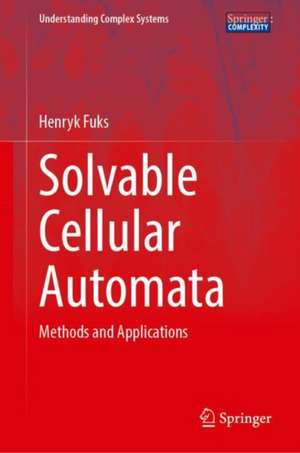Solvable Cellular Automata: Methods and Applications: Understanding Complex Systems
Autor Henryk Fukśen Limba Engleză Hardback – 10 oct 2023
Din seria Understanding Complex Systems
- 18%
 Preț: 1112.30 lei
Preț: 1112.30 lei -
 Preț: 439.25 lei
Preț: 439.25 lei - 18%
 Preț: 1119.38 lei
Preț: 1119.38 lei - 15%
 Preț: 401.82 lei
Preț: 401.82 lei - 18%
 Preț: 1247.26 lei
Preț: 1247.26 lei - 15%
 Preț: 641.20 lei
Preț: 641.20 lei - 15%
 Preț: 642.68 lei
Preț: 642.68 lei - 15%
 Preț: 651.51 lei
Preț: 651.51 lei - 18%
 Preț: 946.55 lei
Preț: 946.55 lei - 18%
 Preț: 947.98 lei
Preț: 947.98 lei - 20%
 Preț: 650.27 lei
Preț: 650.27 lei - 18%
 Preț: 952.09 lei
Preț: 952.09 lei - 18%
 Preț: 957.13 lei
Preț: 957.13 lei - 18%
 Preț: 943.88 lei
Preț: 943.88 lei -
 Preț: 398.35 lei
Preț: 398.35 lei - 5%
 Preț: 1417.54 lei
Preț: 1417.54 lei - 15%
 Preț: 648.42 lei
Preț: 648.42 lei -
 Preț: 387.75 lei
Preț: 387.75 lei - 18%
 Preț: 1133.76 lei
Preț: 1133.76 lei - 18%
 Preț: 948.16 lei
Preț: 948.16 lei - 20%
 Preț: 655.85 lei
Preț: 655.85 lei - 18%
 Preț: 1113.09 lei
Preț: 1113.09 lei - 20%
 Preț: 655.53 lei
Preț: 655.53 lei - 15%
 Preț: 653.00 lei
Preț: 653.00 lei - 18%
 Preț: 1392.77 lei
Preț: 1392.77 lei - 18%
 Preț: 1010.48 lei
Preț: 1010.48 lei - 18%
 Preț: 955.56 lei
Preț: 955.56 lei -
 Preț: 384.22 lei
Preț: 384.22 lei - 18%
 Preț: 950.66 lei
Preț: 950.66 lei - 15%
 Preț: 638.43 lei
Preț: 638.43 lei - 15%
 Preț: 644.49 lei
Preț: 644.49 lei - 15%
 Preț: 647.40 lei
Preț: 647.40 lei - 15%
 Preț: 649.06 lei
Preț: 649.06 lei - 15%
 Preț: 639.25 lei
Preț: 639.25 lei - 15%
 Preț: 643.65 lei
Preț: 643.65 lei - 18%
 Preț: 960.78 lei
Preț: 960.78 lei - 15%
 Preț: 649.87 lei
Preț: 649.87 lei - 15%
 Preț: 645.47 lei
Preț: 645.47 lei
Preț: 1006.06 lei
Preț vechi: 1226.89 lei
-18% Nou
Puncte Express: 1509
Preț estimativ în valută:
192.54€ • 200.48$ • 162.72£
192.54€ • 200.48$ • 162.72£
Carte tipărită la comandă
Livrare economică 10-24 martie
Preluare comenzi: 021 569.72.76
Specificații
ISBN-13: 9783031386992
ISBN-10: 303138699X
Pagini: 296
Ilustrații: XIX, 296 p. 41 illus., 28 illus. in color.
Dimensiuni: 155 x 235 mm
Greutate: 0.62 kg
Ediția:1st ed. 2023
Editura: Springer Nature Switzerland
Colecția Springer
Seria Understanding Complex Systems
Locul publicării:Cham, Switzerland
ISBN-10: 303138699X
Pagini: 296
Ilustrații: XIX, 296 p. 41 illus., 28 illus. in color.
Dimensiuni: 155 x 235 mm
Greutate: 0.62 kg
Ediția:1st ed. 2023
Editura: Springer Nature Switzerland
Colecția Springer
Seria Understanding Complex Systems
Locul publicării:Cham, Switzerland
Cuprins
Deterministic cellular automata.- Deterministic initial value problem.- Multiplicative and additive rules.- More complex rules.- Exploiting rule identities.- Rules with additive invariants.- Construction of probability measures.- Probabilistic solutions.- Probabilistic cellular automata.- Applications.- Local structure approximation.- Non-solvable rules.- Appendices.
Notă biografică
Henryk Fukś is a Professor at the Department of Mathematics and Statistic of Brock University in St. Catharines, Canada. He received his Ph.D. at the University of Illinois at Chicago in 1997, and afterwards held the NSERC postdoctoral fellowship at the University of Guelph and the Fields Institute for Research in Mathematical Sciences in Toronto. He published over 70 research papers, mostly in the field of cellular automata. In addition to cellular automata, his research interests include complex systems, cooperative phenomena, phase transitions, mathematical modelling as well as history of mathematics.
Textul de pe ultima copertă
The main focus of the book is solvability of cellular automata, that is, expressing the state of a given cell after a given number of steps by an explicit formula. The author considers solutions of two types of initial value problems for cellular automata, the deterministic one and the probabilistic one. In the first chapter the basic concepts of cellular automata theory are introduced. Deterministic initial value problem is introduced next and solutions for selected simple rules are also presented. In the following chapters various techniques for solving the deterministic problem are introduced, using elementary CA rules of increasing complexity as examples. The second part of the book introduces the concept of probability measure in the context of cellular automata and the probabilistic initial value problem for both deterministic and probabilistic rules. The book is amply illustrated with examples and applications such as the density classification problem, phase transitions in traffic models or the diffusion of innovations model. In the appendix, solution formulae (both deterministic and probabilistic) for over 60 elementary cellular automata rules are listed. Ruelle-Frobenius-Perron equations for all 88 minimal elementary cellular automata are also provided.
Caracteristici
Addresses solvability of cellular automata with many results and applications Provides an appendix with solution formulas, both deterministic and probabilistic, for over 60 cellular automata Provides a quick overview table which are solvable in both deterministic and probabilistic sense
